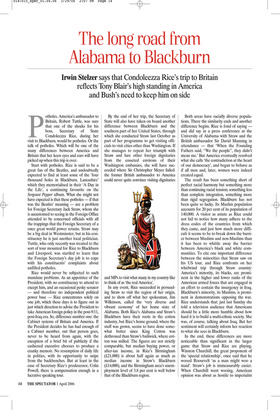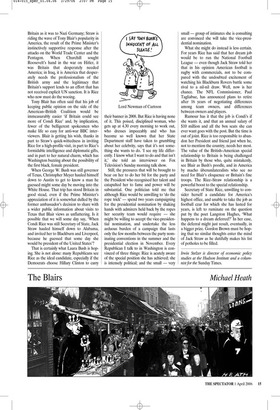The long road from Alabama to Blackburn
Irwin Stelzer says that Condoleezza Rice’s trip to Britain reflects Tony Blair’s high standing in America and Bush’s need to keep him on side Potholes. America’s ambassador to Britain, Robert Tuttle, was sure that one of the shocks for his boss, Secretary of State Condoleezza Rice, during her visit to Blackburn, would be potholes. Or the talk of potholes. Which will be one of the many differences between America and Britain that her keen eyes and ears will have picked up when this trip is over.
Start with potholes. Rice is said to be a great fan of the Beatles, and undoubtedly expected to find at least some of the ‘four thousand holes in Blackburn, Lancashire’ which they memorialised in their ‘A Day in the Life’, a continuing favourite on the Sergeant Pepper album. What she might not have expected is that these potholes — if that was the Beatles’ meaning — are a problem for Foreign Secretary Jack Straw, whom she is accustomed to seeing in the Foreign Office attended to by concerned officials with all the trappings that the Foreign Secretary of a once great world power retains. Straw may be a big deal in Westminster, but in his constituency he is just another local politician. Tuttle, who only recently was treated to the sort of tour mounted for Rice to Blackburn and Liverpool, was startled to learn that the Foreign Secretary’s day job is to cope with his constituents’ complaints about unfilled potholes.
Rice would never be subjected to such mundane problems. As an appointee of the President, with no constituency to attend to except him, and an occasional pesky senator — and therefore no independent political power base — Rice concentrates solely on one job, which these days is to figure out in just which direction to advise the President to take American foreign policy in the post-9/11, post-Iraq era. So, difference number one: the Cabinet systems of Britain and America. If the President decides he has had enough of a Cabinet member, out that person goes, never to be heard from again, with the exception of a brief bit of publicity if the cashiered executive chooses to produce a cranky memoir. No resumption of daily life in politics, with its opportunity to snipe from the backbenches. But at least in the case of Secretary Rice’s predecessor, Colin Powell, there is compensation enough in a lucrative speaking tour. By the end of her trip, the Secretary of State will also have taken on board another difference between Blackburn and the southern part of her United States, through which she conducted Straw last October as part of her programme to get visiting officials to visit cities other than Washington. If she manages to repeat her triumph with Straw and lure other foreign dignitaries from the cosseted environs of their Washington embassies, she will have succeeded where Sir Christopher Meyer failed: the former British ambassador to America could never quite convince visiting dignitaries and MPs to visit what many in my country like to think of as ‘the real America’.
In any event, Rice succeeded in persuading Straw to visit the region of her origin, and to show off what her spokesman, Jim Wilkinson, called the ‘very diverse and vibrant economy’ of her home state of Alabama. Both Rice’s Alabama and Straw’s Blackburn have their roots in the cotton industry, but Rice’s home ground, where the stuff was grown, seems to have done somewhat better since King Cotton was dethroned than Straw’s bailiwick, where cotton was milled. The figures are not strictly comparable, but median buying power, or after-tax income, in Rice’s Birmingham (£21,000) is about half again as much as median income in Straw’s Blackburn (£14,000), and the Birmingham area’s unemployment level of 3.8 per cent is well below that of the Blackburn region. Both areas have racially diverse populations. There the similarity ends and another difference begins. Rice is fond of saying and did say in a press conference at the University of Alabama with Straw and the British ambassador Sir David Manning in attendance — that ‘When the Founding Fathers said, “We the people”, they didn’t mean me.’ But America eventually resolved what she calls ‘the contradiction at the heart of our democracy’, and began to behave as if all men and, later, women were indeed created equal.
The result has been something short of perfect racial harmony but something more than continuing racial tension; something less than complete integration, something more than rigid segregation. Blackburn has not been quite so lucky. Its Muslim population accounts for 20 per cent of its population of 140,000. A visitor as astute as Rice could not fail to notice how many adhere to the dress codes of the countries from which they came, and just how much more difficult it seems to be to break down the barrier between Muslims and non-Muslims than it has been to whittle away the barrier between America’s black and white communities. To cite one important difference between the minorities that Straw saw on his US tour, and Rice confronts on her whirlwind trip through Straw country: America’s minority, its blacks, are prominent in the higher and lower ranks of the American armed forces that are engaged in an effort to contain the insurgency in Iraq. Blackburn’s minority, its Muslims, is prominent in demonstrations opposing the war. Rice understands that: just last Sunday she told a television audience that Americans should be a little more humble about how hard it is to build a multi-ethnic society. She was, of course, talking about Iraq. But her sentiment will certainly inform her reaction to what she sees in Blackburn.
In the end, these differences are more noticeable than significant in the larger game that Straw and Rice are playing. Winston Churchill, the great proponent of the ‘special relationship’, once said that he wooed Roosevelt ‘as a man might woo a maid’. Straw’s job is immeasurably easier. When Churchill went wooing, American opinion was about as hostile to imperialist Britain as it was to Nazi Germany; Straw is riding the wave of Tony Blair’s popularity in America, the result of the Prime Minister’s instinctively supportive response after the attacks on the World Trade Center and the Pentagon. When Churchill sought Roosevelt’s hand in the war on Hitler, it was Britain that desperately needed America; in Iraq, it is America that desperately needs the professionalism of the British army and the legitimacy that Britain’s support lends to an effort that has not received explicit UN sanction. It is Rice who now must do the wooing.
Tony Blair has often said that his job of keeping public opinion on the side of the American–British Coalition would be immeasurably easier ‘if Britain could see more of Condi Rice’ and, by implication, fewer of the belligerent spokesmen who make life so easy for anti-war BBC interviewers. Blair is getting his wish, thanks in part to Straw’s quick-wittedness in inviting Rice for a high-profile visit, in part to Rice’s formidable intelligence and diplomatic gifts, and in part to her natural charm, which has Washington buzzing about the possibility of the first black, female president.
When George W. Bush was still governor of Texas, Christopher Meyer hauled himself down to Austin to get to know a man he guessed might some day be moving into the White House. That trip has stood Britain in good stead, even if the Prime Minister’s appreciation of it is somewhat dulled by the former ambassador’s decision to share with a wider public information about visits to Texas that Blair views as unflattering. Is it possible that we will some day say, ‘When Condi Rice was still Secretary of State, Jack Straw hauled himself down to Alabama, and invited her to Blackburn and Liverpool, because he guessed that some day she would be president of the United States’?
That is certainly what Laura Bush is hoping. She is not alone: many Republicans see Rice as the ideal candidate, especially if the Democrats choose Hillary Clinton to carry their banner in 2008. But Rice is having none of it. This poised, disciplined woman, who gets up at 4.30 every morning to work out, who dresses impeccably and who has become so well known that her State Department staff have taken to grumbling about her celebrity, says that it’s not something she wants to do. ‘I see my life differently. I know what I want to do and that isn’t it,’ she told an interviewer on Fox Television’s Sunday morning talk show.
Still, the pressures that will be brought to bear on her to do her bit for the party and the President who recognised her talent and catapulted her to fame and power will be substantial. One politician told me that although Rice would be unwilling to ‘do the rope trick’ — spend two years campaigning for the presidential nomination by shaking hands with admirers held back by the ropes her security team would require — she might be willing to accept the vice-presidential nomination, and undertake the less arduous burden of a campaign that lasts only the few months between the party nominating conventions in the summer and the presidential election in November. Every Republican I talk to in Washington is convinced of three things: Rice is acutely aware of the special position she has achieved; she is intensely political; and the small — very small — group of intimates she is consulting are convinced she will take the vice-presidential nomination.
What she might do instead is less certain. For years Rice has said that her dream job would be to run the National Football League — even though Jack Straw told her that in his opinion American football is rugby with commercials, not to be compared with the undoubted excitement of watching his Blackburn Rovers battle some rival to a nil-nil draw. Well, now is her chance. The NFL Commissioner, Paul Tagliabue, has announced plans to retire after 16 years of negotiating differences among team owners, and differences between owners and players.
Rumour has it that the job is Condi’s if she wants it, and that an annual salary of $10 million and all the box seats she can ever want goes with the post. But the time is out of joint. Rice is too responsible to abandon her President and friend just when he, not to mention the country, needs her most. The value of the British–American special relationship to Britain is being challenged in Britain by those who, quite mistakenly, see Blair as Bush’s poodle, and in America by macho überunilateralists who see no need for Blair’s eloquence or Britain’s fine troops. The Rice–Straw relationship is a powerful boost to the special relationship.
Secretary of State Rice, unwilling to consider herself a candidate for America’s highest office, and unable to take the job as football czar for which she has lusted for years, is left to ruminate on the question put by the poet Langston Hughes, ‘What happens to a dream deferred?’ In her case, the deferral might just result, eventually, in a bigger prize. Gordon Brown must be hoping that no similar thoughts enter the mind of Jack Straw as he dutifully makes his list of potholes to be filled.



























































































 Previous page
Previous page